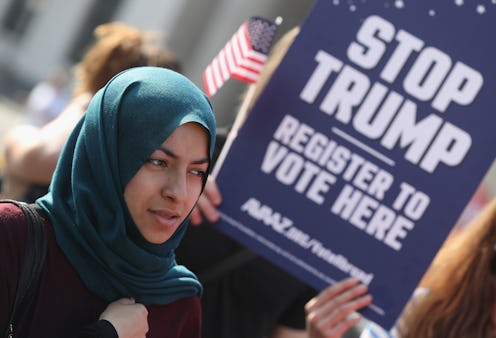News
6 Muslim Women Running For Office You Can Support If You Want To Elevate Diverse Voices

As a record number of women candidates hit the campaign trail in 2018, women from minority communities are joining the fight for equal representation. If you want to elevate diverse voices in American politics, there are several Muslim women running for office across the country who could use your support — and there's no better time to do so than in honor of Muslim Women's Day on Tuesday. Whether they're running for Congress or their local county board, these women want to stand up for people of all backgrounds.
Rep. Keith Ellison (D-MN) became the first Muslim elected to Congress in 2006, but there's never been a Muslim woman elected to serve on Capitol Hill. Because the Trump administration has banned visitors from Muslim-majority countries from entering the United States and said he thinks "Islam hates us," political contests have become incredibly personal for many Muslim candidates.
Of all the Muslim candidates running in 2018, roughly 36 percent are women, according to the Muslim Public Affairs Council. More than 30,000 women in total have reached out to Emily's List, a group that trains pro-choice Democratic women to run for office, since the 2016 election. Races are already heating up as states begin to hold party primaries ahead of November's midterm elections. While some Muslim women didn't make it past the primary stage, these candidates still have a shot at winning elected office later this year.
Fayrouz Saad
The 34-year-old Democrat running in Michigan's 11th Congressional District previously worked in state politics and served in the U.S. Department of Homeland Security under former President Obama. In 2015, Saad became the first head of Detroit's Office of Immigrant Affairs helping immigrants find jobs and start businesses in Michigan.
Rashida Tlaib
Two districts over, in Michigan's 13th, Tlaib is also fighting for a seat in the U.S. House of Representatives. She joined the race to fill former Rep. John Conyers' position following his resignation. Tlaib made history in 2008 when she became the first Muslim woman to serve in the Michigan state legislature.
"Serving in the U.S. Congress is about much more than voting, it is about taking on the bullies and demanding that government work for the people, even when it is unpopular," her website says. "For too long we have coddled politicians who focus on making a name for themselves instead of making a difference."
Deedra Abboud
Abboud wants to snag a U.S. Senate seat in Arizona left open by Republican Jeff Flake's retirement. She's an attorney, author, and entrepreneur who has advocated for banning military-style assault weapons and a "clean" DREAM Act that would provide a path to citizenship for people who were brought to the United States illegally as children.
Ilhan Omar
Minnesota state Rep. Omar launched her re-election campaign in January. She was first elected as a member of the state's Democratic–Farmer–Labor Party in 2016, making her the first Somali-American Muslim person elected to office in the United States.TIME magazine included her in its list of "women who are changing the world" last year.
Regina Mustafa
Democrat Mustafa is running for mayor of Rochester, Minnesota. The self-described community activist founded the city's Community Interfaith Dialogue on Islam with the mission of fostering interfaith dialogue. If elected, she says she would become the first Muslim mayor of a U.S. city and the first legally blind mayor in the country.
Hadiya Afzal
Afzal, an 18-year-old college student, is running for the DuPage County Board in Illinois. Her website says she may be running as a Democrat, but that she's "ultimately running for everyone in District 4."
"People often tell us college students that we'll be saddled with debt for decades, that there are few job opportunities for college graduates, and that there's less hope for our generation than any other before us," she says in her first campaign video. "But I believe that building a dynamic future is within out generation's power."
Whether you're able to pitch in financially or voice your support on social media, you can celebrate Muslim Women's Day by helping put more Muslim women in office.